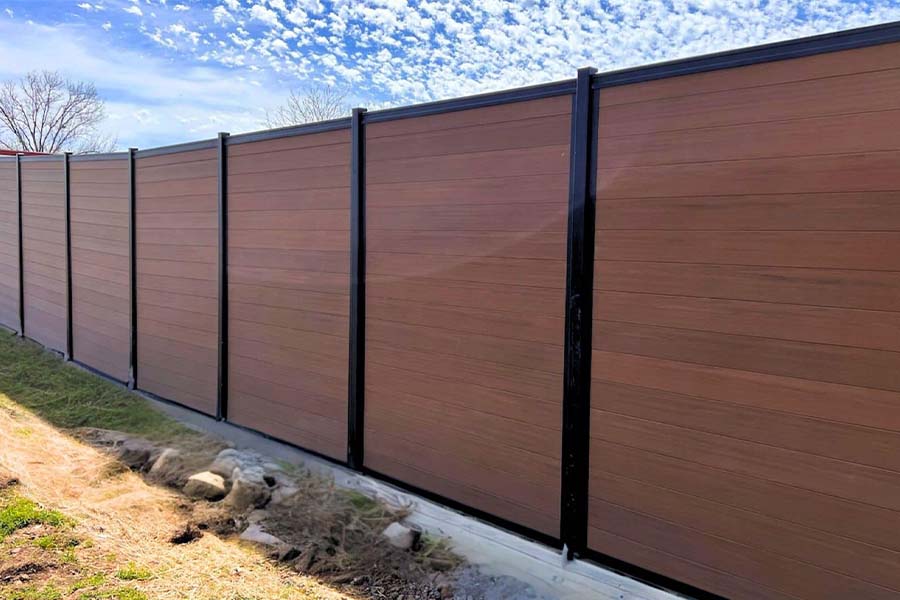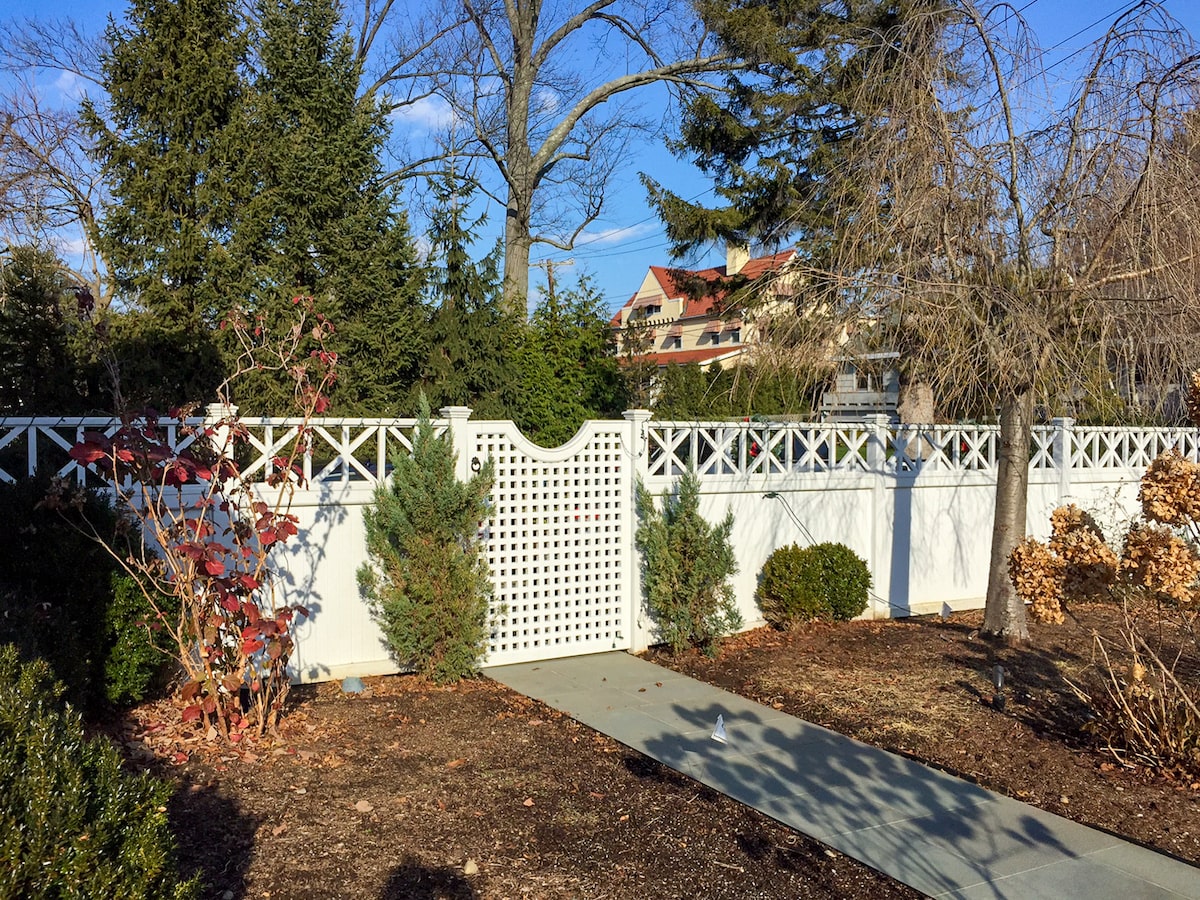All Categories
Featured
Choosing the appropriate sort of fence for your building is a choice that calls for thoughtful consideration of several elements, from the product and style to its objective and maintenance demands. A fencing not only serves useful functions such as safety and security and privacy however can likewise improve the aesthetic allure of your home. With a selection of products readily available, it's vital to recognize what works best for your certain requirements.
![]()
Personal privacy: If your goal is to shut out the sight from passersby or neighbors, you'll want a strong fencing without any spaces. Materials like vinyl, timber, and composite are popular choices for privacy fences. They give the essential protection to ensure a private yard or garden area. Safety and security: For keeping trespassers out or safeguarding kids and pets, you'll need a solid, high fence. Metal fencings such as steel, light weight aluminum, or chain web link deal great sturdiness and are challenging to climb. These materials are likewise excellent for creating a safe border around your residential property. Aesthetic Allure: If the purpose of your fence is extra attractive than functional, you could choose a picket fencing, functioned iron, or a split rail fencing. These choices give an attractive boundary without supplying complete personal privacy. 2. Consider Your Spending plan. Your spending plan will certainly play a critical role in your decision. Different materials included varying rate points, so it's crucial to think about just how much you agree to spend. Here are some basic standards:
Wood Secure Fencing: Among one of the most cost-efficient choices, wood fencings can be customized and installed quickly, though they need upkeep to stop rot and bending. Routine staining or paint is needed to preserve its look and resilience. Vinyl Fencing: While plastic is more pricey upfront than wood, it's a low-maintenance option. Vinyl fencings don't require paint, staining, or securing, and they are resistant to degeneration, fading, and pests. They can be vulnerable to breaking in severe chilly temperatures. Chain Web Link Secure Fencing: If your major top priority is keeping costs reduced, chain link fencings are the most affordable alternative. While they do not offer much in terms of personal privacy, they're functional for noting and protecting family pets home borders. Steel Secure Fencing (Aluminum or Steel): Steel fences are sturdy, long-lasting, and practically maintenance-free. While they can be costlier than wood or chain link, they use added protection and a smooth, modern appearance. 3. Longevity and Upkeep Demands. Consider the long-lasting toughness of your fence and just how much effort and time you want to purchase maintenance:
![]()
Timber: While wood uses an all-natural look, it requires normal upkeep, including tarnishing and securing, to protect it from the aspects. Wood fencings can last 10-15 years with correct maintenance. Plastic: Plastic fencings are low-maintenance and are extremely sturdy. They won't rot, warp, or discolor over time. Once installed, you can anticipate a plastic fence to last for a number of years with marginal care. Steel: Light weight aluminum and steel fences are very resilient and call for little to no upkeep. Aluminum will not corrosion, and steel can be treated with a safety finishing to avoid rust. Both choices can stand up to harsh weather and are best for lasting usage. Chain Link: Although wire mesh fence are tough and durable, they may require periodic repair services, specifically if the galvanized finishing begins to subside. They can corrosion with time, though modern-day finishings like vinyl are readily available to expand the life-span. 4. Consider Aesthetic Appeal. The design and style of the fence ought to match the architecture of your residential property. Think about the overall visual you intend to attain:
Conventional Residences: For even more timeless, traditional buildings, a wood or functioned iron fence might be the most effective fit. These products supply a timeless appeal and can be tailored to match the style of your home. Modern or Contemporary Homes: If you have a modern home, you might want to choose streamlined, minimalistic materials like aluminum or plastic. These fences offer a tidy appearance and can be customized with various shades or surfaces. Ranch or Country Settings: For larger residential properties or country setups, split-rail or ranch-style fences can give a genuine look and appropriate for defining property boundaries while still allowing for an open view. 5. Climate Considerations. The environment in your region plays a vital role in identifying the finest material for your fencing. If you reside in an area with high humidity or heavy rains, wood might warp or rot unless dealt with appropriately. Vinyl and metal choices, however, do well in the majority of environments and are less susceptible to damages caused by wetness.
![]()
Final thought. Picking the appropriate fencing for your residential or commercial property depends upon recognizing your demands, spending plan, and individual preferences. Whether you're focusing on privacy, safety, aesthetic appeals, or low maintenance, there is a wide range of choices readily available. By taking into consideration the material, durability, and design of your fence, you can ensure that it improves the function and appearance of your home for several years to find.

- Examine the Purpose of the Fencing. The very first step in choosing the suitable fence is understanding its key feature. The kind of fencing you select will rely on what you intend to accomplish:
Personal privacy: If your goal is to shut out the sight from passersby or neighbors, you'll want a strong fencing without any spaces. Materials like vinyl, timber, and composite are popular choices for privacy fences. They give the essential protection to ensure a private yard or garden area. Safety and security: For keeping trespassers out or safeguarding kids and pets, you'll need a solid, high fence. Metal fencings such as steel, light weight aluminum, or chain web link deal great sturdiness and are challenging to climb. These materials are likewise excellent for creating a safe border around your residential property. Aesthetic Allure: If the purpose of your fence is extra attractive than functional, you could choose a picket fencing, functioned iron, or a split rail fencing. These choices give an attractive boundary without supplying complete personal privacy. 2. Consider Your Spending plan. Your spending plan will certainly play a critical role in your decision. Different materials included varying rate points, so it's crucial to think about just how much you agree to spend. Here are some basic standards:
Wood Secure Fencing: Among one of the most cost-efficient choices, wood fencings can be customized and installed quickly, though they need upkeep to stop rot and bending. Routine staining or paint is needed to preserve its look and resilience. Vinyl Fencing: While plastic is more pricey upfront than wood, it's a low-maintenance option. Vinyl fencings don't require paint, staining, or securing, and they are resistant to degeneration, fading, and pests. They can be vulnerable to breaking in severe chilly temperatures. Chain Web Link Secure Fencing: If your major top priority is keeping costs reduced, chain link fencings are the most affordable alternative. While they do not offer much in terms of personal privacy, they're functional for noting and protecting family pets home borders. Steel Secure Fencing (Aluminum or Steel): Steel fences are sturdy, long-lasting, and practically maintenance-free. While they can be costlier than wood or chain link, they use added protection and a smooth, modern appearance. 3. Longevity and Upkeep Demands. Consider the long-lasting toughness of your fence and just how much effort and time you want to purchase maintenance:

Timber: While wood uses an all-natural look, it requires normal upkeep, including tarnishing and securing, to protect it from the aspects. Wood fencings can last 10-15 years with correct maintenance. Plastic: Plastic fencings are low-maintenance and are extremely sturdy. They won't rot, warp, or discolor over time. Once installed, you can anticipate a plastic fence to last for a number of years with marginal care. Steel: Light weight aluminum and steel fences are very resilient and call for little to no upkeep. Aluminum will not corrosion, and steel can be treated with a safety finishing to avoid rust. Both choices can stand up to harsh weather and are best for lasting usage. Chain Link: Although wire mesh fence are tough and durable, they may require periodic repair services, specifically if the galvanized finishing begins to subside. They can corrosion with time, though modern-day finishings like vinyl are readily available to expand the life-span. 4. Consider Aesthetic Appeal. The design and style of the fence ought to match the architecture of your residential property. Think about the overall visual you intend to attain:
Conventional Residences: For even more timeless, traditional buildings, a wood or functioned iron fence might be the most effective fit. These products supply a timeless appeal and can be tailored to match the style of your home. Modern or Contemporary Homes: If you have a modern home, you might want to choose streamlined, minimalistic materials like aluminum or plastic. These fences offer a tidy appearance and can be customized with various shades or surfaces. Ranch or Country Settings: For larger residential properties or country setups, split-rail or ranch-style fences can give a genuine look and appropriate for defining property boundaries while still allowing for an open view. 5. Climate Considerations. The environment in your region plays a vital role in identifying the finest material for your fencing. If you reside in an area with high humidity or heavy rains, wood might warp or rot unless dealt with appropriately. Vinyl and metal choices, however, do well in the majority of environments and are less susceptible to damages caused by wetness.

- Neighborhood Rules and HOA Standards. Before settling your fence choice, make certain to consult your neighborhood community or property owners organization (HOA) for any kind of constraints regarding fence elevation, products, or style. Numerous areas have details regulations in area, and it is necessary to comply to prevent prospective fines or needing to tear down the fencing.
Final thought. Picking the appropriate fencing for your residential or commercial property depends upon recognizing your demands, spending plan, and individual preferences. Whether you're focusing on privacy, safety, aesthetic appeals, or low maintenance, there is a wide range of choices readily available. By taking into consideration the material, durability, and design of your fence, you can ensure that it improves the function and appearance of your home for several years to find.
Latest Posts
Top-Quality Auto Repair Locally - Trust Montclare’s Certified Professionals
Published Apr 19, 25
2 min read
Change Your Home with Quality Flooring Solutions
Published Apr 18, 25
1 min read
Full Circle Strategic Marketing - Boost Business Leads with Custom Marketing Solutions
Published Apr 18, 25
2 min read
More
Latest Posts
Top-Quality Auto Repair Locally - Trust Montclare’s Certified Professionals
Published Apr 19, 25
2 min read
Change Your Home with Quality Flooring Solutions
Published Apr 18, 25
1 min read
Full Circle Strategic Marketing - Boost Business Leads with Custom Marketing Solutions
Published Apr 18, 25
2 min read